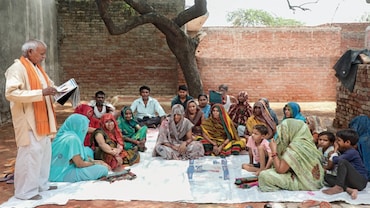Astad Dinshah Gorwala, The Man Who Would Not Be Silent
Named after the Zoroastrian angel of righteousness, this dedicated editor went through life as a kind of happy warrior—fighting for honesty, integrity and common sense
 Illustration by Ajay Thakuri
Illustration by Ajay Thakuri
Sardar Wahid Bux Khan Bhutto, one of the richest and most powerful zamindars in the Sind, was incensed. Three of his men had been convicted of cattle rustling by a brash young magistrate named A. D. Gorwala. Sardar Bux saw this as an affront to his dignity and was determined to teach Gorwala a lesson.
A few days later a group of zamindar’s henchmen abducted the wife of the chief witness against the rustlers. Gorwala acted swiftly and had the kidnappers arrested. Sardar Wahid Bux lobbied hard to get the authorities to drop the case, and several prominent people hinted to the young magistrate that it would not help his career if he insisted on pressing charges. But Gorwala was adamant. However, the case was transferred to another district. There, after a protracted trial in which the key witnesses changed their stories, the men were acquitted. (The missing woman was never found.) But Gorwala’s message had been driven home: The zamindars of Sind could no longer flout the law with impunity.
The same fearlessness and pugnacity characterized Astad Dinshah Gorwala nearly 50 years later when he took on a far more formidable opponent—the Government of India. On 26 June 1975, when Indira Gandhi imposed an internal emergency, assumed dictatorial power and muzzled the press, the erstwhile magistrate, now a frail man in his 70s, began the greatest battle of his long career.
Under the new press laws, Gorwala, editor and owner of the weekly magazine Opinion, had to submit all the manuscripts to the censor. When the officials began to black out speeches by Socrates, even verses from the Bhagavad Gita, Gorwala rebelled—and simply ignored the censor.
Brute Force
For several months, the authorities let him be. But when Opinion’s attacks on government policy became more vigorous and it began to carry uncensored parliamentary debates—the only English-language journal in the country that dared to do so—the government cracked down. Authorities threatened to confiscate several issues and warned the press where the magazine had been printed for 16 years. When Gorwala switched printers, police (without a magistrate’s order) descended upon the new press and broke up pages already set in type. The editor was forced to cyclostyle [an early method used for duplicating handwriting] his magazine.
On 30 April 1976, Gorwala was ordered to pay a security deposit for promoting “feelings of enmity and hatred”. He had no difficulty in getting a stay order from the Bombay High Court, but the government harassment continued. The post office refused to deliver Opinion and finally in July 1976, the government ordered Gorwala to close it down.
With Opinion closed, he resorted to sending cyclostyled letters to about 500 of the magazine’s subscribers. His criticisms of the government continued unabated. In one letter he called Mrs Gandhi an “arrant liar” and her son, Sanjay, a “goonda”. The government is said to have considered freezing Gorwala’s bank account and his arrest seemed imminent. “Every time he took a little longer to answer his telephone or come to the door,” a friend recalled, “I was sure he had been taken away.”
But Gorwala remained free. One reason, perhaps, is that the government didn’t want to make him a martyr. Another possibility is that Mrs Gandhi gave orders that he not be touched: “She probably had a sneaking admiration for the valiant old man,” one of his friends suggests.
If Indira Gandhi did admire him, she would not be alone. Throughout his career, first as a civil servant and then as an editor and commentator on public affairs, Gorwala won respect for his fierce independence and remarkable integrity in matters great and small. During the prohibition in Bombay, when the law was widely flouted, Gorwala though no teetotaller himself, rigidly abstained, arguing that in a democracy all rules, no matter how absurd, must be obeyed. “For most of us,” says poet Kersey Katrak, “our ideals and ideal behaviour are at variance. But Gorwala is a man of one piece.”
The man’s honesty—his pugnacity—have their roots in his religious upbringing. He was born in Quetta [now in Pakistan] on 9 December 1900, and his Parsee parents instilled in him the essentials of Zoroastrianism: the everlasting struggle between Good and Evil and the duty of all true believers to fight on the side of the Good. Gorwala grew up like a true Zarthosti—as a sort of happy warrior, fighting the good fight, indifferent to suffering or ostracism.
In 1921, while he was studying law in Bombay, the British announced that entrance examinations of the elite Indian Civil Service (ICS), previously conducted only in Britain, would be held in India. He took the exam and was one of the nine candidates accepted from India. After two years of training at Cambridge University, Gorwala was posted to Sind, a largely desert region in the north-west subcontinent. He administered a vast area containing hundreds of thousands of people, and soon gained recognition as an outstanding ICS officer.
His methods were often unorthodox. Once, hearing that a communal riot was imminent, he rushed to the area, arrested the leaders of the two groups, and had them locked up in the same cell until they sorted out their differences.
Sind was then a feudal society with a tiny class of wealthy zamindars exploiting an impoverished peasantry. Gorwala was determined to check the rapacity of these landlords and incessantly toured the area listening to complaints and settling grievances. India’s finance minister [in 1978], H. M. Patel, a former ICS official who also served in Sind, recalls that peasants often referred to the ideal justice as “Gorwala’s justice”.
Good Administrator
In December 1941, at a critical time during World War II, Gorwala was transferred to Bombay, first as the province’s finance secretary and then as supply commissioner. With Burma in Japanese hands, rice supplies from there had been cut off, food grain prices were skyrocketing and many people faced starvation. As executive head of Food Control Operations in Bombay Province, Gorwala had a comprehensive rationing system set up, a formidable undertaking no provincial government had yet attempted. Then the monsoons failed. Rationing was extended to the countryside, and by September 1944, the Bombay government was feeding more than 60 per cent of the province. But for this massive effort, experts say, Bombay would have seen a repetition of the tragic Bengal famine of 1943–44, in which more than one-and-a-half million people perished.
Ironically, food control led to Gorwala’s exit from the ICS. In January 1947, he was asked to advise the Government of India on ways to curb inflation. With the western half of Punjab—the granary of the subcontinent—going to Pakistan, and millions of destitute refugees pouring into India, the situation was critical. Gorwala strongly urged the retention of price controls. But traders, sensing this was a time to make a killing, launched a full-scale attack on the restrictions, and despite his warnings, the government gave in. Gorwala resigned, giving up his brilliant ICS career.
“Ordinarily,” he says, “a civil servant must implement the government’s policies even if he disagrees with them. But if you feel a policy will cause great harm, you are honour-bound to protest, and in the last resort, resign.”
His foreboding proved only too true. Food prices quickly jumped by 30 per cent, and in October 1948 the government was compelled to re-impose controls. Meanwhile, millions had been brought to the brink of starvation.
Soon after his resignation, Gorwala once again turned his attention to public affairs through weekly columns in The Statesman and The Times of India. The columns ranged over politics, economics, administration and foreign policy. But the strongest recurring theme was the belief in the vital importance of personal integrity in public life.
Gorwala’s concern with ethics was prompted by growing corruption in the ruling Congress party. Many Congressmen, flush with power, had jettisoned their pre-Independence idealism and Gandhian teachings, and were amassing illegal fortunes. For this, Gorwala blamed Jawaharlal Nehru: While personally honest, the Prime Minister was at fault for not using his enormous powers to check the venality of his partymen.
Severe Critic
The columnist also criticized Nehru for his complacency towards communism. A non-aligned foreign policy, Gorwala argued, did not mean that India should overlook the basic moral difference between the democratic West and the totalitarian Soviet bloc. Moreover, he said, it was dangerous to belittle the military threat from China—a warning that proved disastrously accurate when the Chinese routed the Indian army in the border war of 1962.
His dogged hammering away finally took its toll. The government, which had continued to consult Gorwala about various problems, turned its back on him, and The Times of India and The Statesman abruptly stopped printing his columns. “Do you think I run this paper to annoy the Prime Minister?” an angry publisher asked the editor. For a while, Gorwala wrote for other papers. “But by 1960,” he said wryly, “no one would touch me.”
Refusing to be silenced, Gorwala started Opinion, which for the last 17 years has been a vigorous champion of honesty and common sense in public life. Priced at an uneconomical Rs 2 annually, it loses money most years, but Gorwala—a bachelor of modest habits—doesn’t mind. He finds it more than sufficient compensation that every week the journal reaches 5,000 loyal readers, ranging from small businessmen to eminent intellectuals.
After the fall of the Congress government in 1977, friends urged the editor to discontinue Opinion. (It had begun appearing as soon as Mrs Gandhi lifted the censorship and announced elections in 1977.) Gorwala’s eyesight was failing; he was doubled with arthritis. Now that democracy had been restored, his friends argued, he could relax.
But Gorwala refused. Just because a dictator had been overthrown, it didn’t mean the new men shouldn’t be looked over sharply. True to form, Gorwala reproduced excerpts from two of his previous articles in which he had criticized Morarji Desai [the newly elected Prime Minister in 1977] for nepotism and lack of integrity.
For 30 years, Astad Dinshah Gorwala has been a voice in the wilderness. If the India of his dreams remains as remote as ever, this ailing, white-bearded patriarch fights on as a soldier for the good—an example for all, his battle standard the words of the Bhagavad Gita he quotes so often:
Find full reward of right
In doing right
Let the right deeds be thy motive
Not the fruits thereof.
In 1982, an increasingly infirm Gorwala handed over the task of bringing out Opinion to one of his journalist friends. But in early 1983, the two men fell out—over an obituary on G. D. Birla in which Gorwala alleged that the business magnate had bribed bureaucrats. (The friend felt that Birla—and other businessmen—were as much sinned against as sinners.) Soon after, Opinion closed for good. Six years later, Gorwala died, five days short of his 89th birthday.






